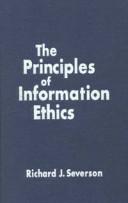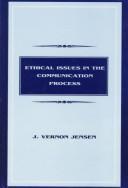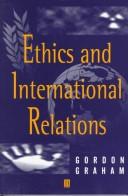| Listing 1 - 10 of 15041 | << page >> |
Sort by
|
Book
Year: 1840 Publisher: Bruxelles Société nationale
Abstract | Keywords | Export | Availability | Bookmark
 Loading...
Loading...Choose an application
- Reference Manager
- EndNote
- RefWorks (Direct export to RefWorks)

ISBN: 1563249588 Year: 1997 Publisher: Armonk, N.Y. London M.E. Sharpe
Abstract | Keywords | Export | Availability | Bookmark
 Loading...
Loading...Choose an application
- Reference Manager
- EndNote
- RefWorks (Direct export to RefWorks)
Information technology --- Moral and ethical aspects. --- Moral and ethical aspects

ISBN: 0805820361 Year: 1997 Volume: *13 Publisher: Mahwah, N. J. L. Erlbaum Associates Publishers
Abstract | Keywords | Export | Availability | Bookmark
 Loading...
Loading...Choose an application
- Reference Manager
- EndNote
- RefWorks (Direct export to RefWorks)
Communication --- Moral and ethical aspects. --- Moral and ethical aspects

ISBN: 0275966461 Year: 1999 Publisher: Westport, CT London Praeger
Abstract | Keywords | Export | Availability | Bookmark
 Loading...
Loading...Choose an application
- Reference Manager
- EndNote
- RefWorks (Direct export to RefWorks)
Suicide --- Moral and ethical aspects. --- Moral and ethical aspects
Book
ISBN: 9051665393 9789051665390 Year: 1996 Publisher: Delft : Eburon,
Abstract | Keywords | Export | Availability | Bookmark
 Loading...
Loading...Choose an application
- Reference Manager
- EndNote
- RefWorks (Direct export to RefWorks)
Book
ISBN: 1855211904 9781855211902 Year: 1994 Publisher: Aldershot : Dartmouth,
Abstract | Keywords | Export | Availability | Bookmark
 Loading...
Loading...Choose an application
- Reference Manager
- EndNote
- RefWorks (Direct export to RefWorks)
Economics --- Moral and ethical aspects. --- Economics - Moral and ethical aspects.

ISBN: 0631196838 Year: 1998 Publisher: Oxford Blackwell
Abstract | Keywords | Export | Availability | Bookmark
 Loading...
Loading...Choose an application
- Reference Manager
- EndNote
- RefWorks (Direct export to RefWorks)
International relations --- Moral and ethical aspects. --- Moral and ethical aspects
Book
ISBN: 069102300X Year: 1988 Publisher: Princeton (N.J.): Princeton university press
Abstract | Keywords | Export | Availability | Bookmark
 Loading...
Loading...Choose an application
- Reference Manager
- EndNote
- RefWorks (Direct export to RefWorks)
War --- Moral and ethical aspects --- War - Moral and ethical aspects.
Book
ISBN: 9781626165076 Year: 2018 Publisher: Washington : Georgetown University Press,
Abstract | Keywords | Export | Availability | Bookmark
 Loading...
Loading...Choose an application
- Reference Manager
- EndNote
- RefWorks (Direct export to RefWorks)
How do we frame decisions to use - or not use - military force ? Who should do the killing ? Do we need new paradigms to guide the use of force ? And what does 'victory' mean in contemporary conflict ? In many ways, these are timeless questions. But they should be asked again in light of changing circumstances in the twenty-first century. The post-Cold War, post-9/11 world is one of contested and fragmented sovereignty. Contested because the norm of territorial integrity has shed some of its absolute nature. Fragmented because some states do not control all of their territory and cannot defeat violent groups operating within their borders. Humanitarian intervention, preventive war, and just war are all framing mechanisms aimed at convincing domestic and international audiences to go to war (or not), as well as to decide who is justified in legally and ethically killing. The international group of scholars assembled for this book critically examine these frameworks to ask if they are flawed, and if so, how they can be improved. Finally, the volume contemplates what all the killing and dying is for if victory may prove, ultimately, to be elusive.
Book
ISBN: 9780190096205 9780190096212 0190096233 0190096217 0190096209 Year: 2020 Publisher: Oxford Oxford University Press
Abstract | Keywords | Export | Availability | Bookmark
 Loading...
Loading...Choose an application
- Reference Manager
- EndNote
- RefWorks (Direct export to RefWorks)
"This book acquaints the reader with arguments for the moral foundations of market society, and the applications of these arguments. Broadly, the book encourages a distinction between capitalism construed as an ideal rather than as a label for the economic status quo and its associated injustices. These foundational arguments are compared with arguments in favour of socialism. Special attention is paid to historically significance figures such as Adam Smith, John Stuart Mill, Karl Marx, and F.A.Hayek. Later chapters deal with more specific and contemporary themes. These include problems not fully foreseen by historic proponents of market order, such as the challenges of climate change, competitive consumption, and the need for an institutionalized order for global trade. Other chapters focus on institutions familiar to most market societies, such as a welfare state, as well as alternatives such as basic income.Overall, the book seeks to both revisit historically influential arguments for capitalism while also seeking to examine how these historical views stand up to contemporary challenges of economic justice. The book is written primarily for an audience of undergraduates (including majors in the humanities and the social sciences). But it would also be useful for anyone seeking a summary of major themes in political economy, particularly those with moral significance"--
Capitalism --- Moral and ethical aspects. --- Capitalism - Moral and ethical aspects.
| Listing 1 - 10 of 15041 | << page >> |
Sort by
|

 Search
Search Feedback
Feedback About UniCat
About UniCat  Help
Help News
News